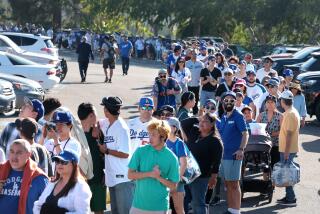COMMENTARY : Slenderized Lasorda Uses Lonely Time to Flash Culinary Signs
This isn’t related to anything in particular, but it might be nice to know that Tom Lasorda cautions us to beware of the dining emporium that calls itself ristorante.
“When it’s called restaurant, “ observes Tom, always helpful, “you usually get a better break on the tab.”
In the past, Lasorda has advised those partaking of buffet never to eat more than they can lift.
And while a saute de boeuf bourguignonne, for instance, wasn’t common fare in the vineyards of Abruzzi, cradle of the Lasordas, Tom has allowed there is nothing wrong with ordering from a French menu, as long as the waiter translates it into English.
Now this once distinguished gourmet sits grimly in Vero Beach, Fla., flanked by diet milkshake powder--and no ball club.
The question has been raised, of course, whether he had a ball club last year. It finished well in the water closet, playing .481.
But, by telephone from the Dodger spring camp, Tom tells his caller he would welcome warmly any major league personnel the club could produce.
At the moment, he was getting ready to watch the minor leaguers play a game, having just dined on a fruit plate, his lunch, following up a breakfast of an Ultra Slim Fast milkshake.
His milkshakes work on a three-day rotation, which is to say, he alternates chocolate, strawberry and vanilla.
When he has pitchers, they work on a five-day rotation, proving to Lasorda the advantages of his milkshakes, which never bow out with a hamstring or a rotator cuff.
“I’m kind of frustrated by what has happened this spring,” confesses Tom. “I felt we would open camp with a team much improved over last year. We added offensive power in Juan Samuel and Hubie Brooks, guys we acquired. And all we needed was a break on Kal Daniels and Kirk Gibson, who were injured.”
When the lockout was ordered this spring, Gibson announced the players would be ready to report “when the owners come to their senses.”
Clearly, owners never should be encouraged by players to come to their senses. In such an event, they won’t pay players the money they do, particularly Gibson, who drew well into the seven figures last year for playing half a season and hitting .213.
“We had very satisfactory pitching last year,” continues Lasorda, “and this could improve if Fernando (Valenzuela) is able to pitch the way he used to.”
The last two seasons, Fernando hasn’t performed in a way noticeably helpful. He won five in 1988 and 10 in ‘89, but, thanks to the lockout, he has been afforded ample rest, giving hope to his manager.
Tom hopes, too, the time off has been beneficial to Samuel, on whose bat he is counting. For the Mets and Phillies last year, Juan hit .235.
When a batsman hits .235, he isn’t supposed to look for riches. It may not even get him a million-and-a-half in today’s market.
And what about Eddie Murray, said to be paid some $2.5 million for hitting .247?
“I’m looking for Eddie to come back big,” says Lasorda. “Coming from the American League, it took him some time to learn the National League pitchers. He is someone I am confident is going to lead us.”
Managing the Dodgers carries serious responsibility, considering that the treasure house in Chavez Ravine is calibrated to doing business.
When, in fact, the Dodgers draw fewer than 3 million, the flag is lowered to half-staff.
The club drew 2,944,653 last year with entertainers who fell on their helmets. But Los Angeles isn’t the type of village that will support a loser with any measure of consistency.
So, at 62, Lasorda is under certain heat but always comforted by the fact that, for all his crises, Walter Alston, Tom’s predecessor, was retained for 23 years and Lasorda is answering the bell for his 14th.
“The Dodgers don’t fire you,” the late Charlie Dressen once observed. “They just worry you a lot.”
Coming off a championship season in 1988, a year in which he partook freely of life’s culinary treasures, Lasorda accepted a bizarre challenge at spring camp last year from Gibson and Orel Hershiser. They offered to contribute to charity if Tom lowered his weight 20 pounds from a happy 218.
He accepted the proposition and not only lost the 20 pounds, but 18 more, scaling down to a trim 180.
And the upshot of this noble undertaking? Tom looked great during the season and the Dodgers looked terrible.
Was this the way to treat a man who, in the name of charity, lived on two diet milkshakes and one sparse meal a day?
Today in Vero Beach, Tom tells you he is holding steady at 182, hard-pressed to watch calories in the absence of activity.
To keep from eating, he flashes signals to players who aren’t there. He makes imaginary pitching changes and argues with phantom umpires.
You point an accusatory finger at the L.A. performers. First, they talk him into dieting, then they dispense a bum season, and now, when he needs them, they don’t show up.
More to Read
Eat your way across L.A.
Get our weekly Tasting Notes newsletter for reviews, news and more.
You may occasionally receive promotional content from the Los Angeles Times.










